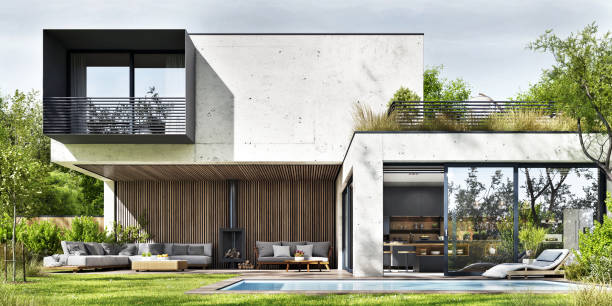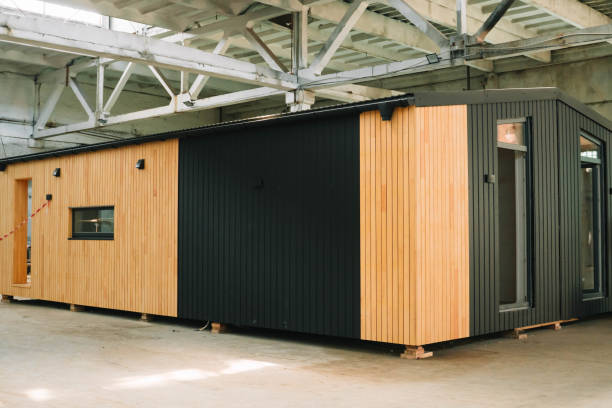In recent years, the popularity of modular homes has surged, driven by advances in technology, sustainability, and affordability. These factory-built homes are now viewed not as temporary or makeshift solutions but as genuine, long-term housing options.
While they may be seen as an alternative to traditional stick-built homes, modular homes have advantages and challenges. If you’re considering a modular home for your future, it’s crucial to understand the pros and cons of this increasingly common housing choice.
What Is a Modular Home?
Before discussing the benefits and drawbacks, it’s essential to understand modular homes. A modular home is a prefabricated house constructed in sections, or modules, in a factory environment. These sections are then transported to the site, where they are assembled and completed.
Unlike mobile homes built on trailers, modular homes are designed to be permanent structures and are often indistinguishable from traditional homes once completed.

Historically, modular homes were associated with cheap, temporary housing options. However, modern modular homes are built to the same standards as traditional homes and offer a wide range of styles and features that meet the needs of homeowners looking for both affordability and durability.
The Benefits of Modular Homes
1. Cost-Effectiveness
One of the most significant advantages of modular homes is their affordability. Modular homes can be 15 to 20 percent cheaper than traditional stick-built homes. This cost reduction stems from several factors:
- Labour Costs: Modular homes are built in a controlled factory environment, eliminating delays and reducing the need for on-site specialised labour. This streamlined construction process lowers labour costs.
- Material Savings: Since modular homes are mass-produced, manufacturers can order materials in bulk, which reduces the overall cost of raw materials.
- Faster Construction: Modular homes are assembled quickly at the building site, reducing construction time. Building a modular home typically takes weeks, whereas traditional homes can take months or longer.
Additionally, the quicker construction process helps save on labour costs, and many modular home builders offer customisable designs, allowing homeowners to choose from various styles without breaking the bank.
2. Quality Control
Contrary to past misconceptions, modern modular homes are of excellent quality. The construction process occurs in a factory setting, where conditions are controlled, and skilled workers handle every construction phase. This environment allows rigorous quality control, ensuring the materials and assembly meet high standards.
- Stricter Regulations: Modular homes must adhere to building codes set by the state or local government. These regulations ensure that they are safe, durable, and well-built.
- Fewer Defects: Since the home is built in a factory and undergoes numerous inspections during its construction, there is a significantly lower chance of defects when compared to homes built on-site.
As a result, modular homes have been shown to hold their value and even appreciate over time, making them a solid investment for many homeowners.
3. Quick Setup
For those in a hurry to move into their new home, modular homes offer an unmatched advantage in terms of speed. Once the modules are delivered to the site, they can be assembled in a matter of days, with the final touches completed in a few weeks.
- Shorter Wait Time: Traditional homes often take several months or even longer to complete, whereas modular homes can be up and running in as little as 30 days from delivery.
- Minimised Delays: Because the construction is done in a controlled environment, factors like weather delays, which can set back the building of traditional homes, are eliminated.
This rapid construction process is particularly appealing for those who need a new home quickly due to relocation, job changes, or other personal reasons.
4. Energy Efficiency
With growing concern about energy consumption and environmental impact, modular homes have become a popular choice for eco-conscious buyers. Many modular homes are designed with energy efficiency in mind, featuring energy-efficient windows, insulation, and siding that help reduce heating and cooling costs.
- Built-In Energy Efficiency: Modular homes typically come with high-performance insulation and energy-efficient windows, which help reduce the home’s carbon footprint and lower energy bills.
- Eco-Friendly Options: Some modular home manufacturers even offer homes built with sustainable materials, solar panels, and other green technologies, making them a top choice for buyers seeking to live in an environmentally responsible manner.
By opting for a modular home, homeowners can save on long-term energy expenses while contributing to sustainability efforts.
The Drawbacks of Modular Homes
Despite their many benefits, modular homes are not the right fit for everyone. Before making the decision to invest in one, several challenges and limitations must be considered. Here’s a deeper dive into the cons of modular homes.
1. Financing Challenges
Securing financing for a modular home can be more difficult than financing a traditional home. Lenders may have reservations about modular homes because they are considered “non-traditional” properties. Since these homes are constructed in a factory and assembled on-site, some banks and financial institutions may have stricter lending requirements or refuse to finance them altogether.
- Higher Interest Rates: Because of the perceived risks involved, some lenders may charge higher interest rates for modular homes than traditional homes.
- Limited Loan Options: Not all banks and mortgage lenders offer loans for modular homes, so potential buyers may need to seek specialised lenders or alternative financing options.
- Need for a Larger Down Payment: To offset the lender’s risk, buyers may be required to put down a larger deposit on the home.
Fortunately, some modular home manufacturers offer financing programs, which can make the process easier. However, prospective buyers should be prepared for a potentially more complex financing process than for traditional homes.
2. Land Availability and Restrictions
Finding suitable land for a modular home can present challenges. Not only do you need to find a plot large enough, but there may also be restrictions on where to place it.
- Zoning Restrictions: Many areas have strict zoning regulations that limit or even prohibit the construction of modular homes. You must check with local authorities to determine whether modular homes are allowed in your desired location.
- Land Cost: In addition to the cost of the modular home itself, buyers must also purchase land. In urban areas or places with high demand, the cost of land can be prohibitively expensive, significantly increasing the overall cost of owning a modular home.
- Site Preparation: Some plots of land may require extensive preparation before the modular home can be placed on it. This could involve clearing trees, levelling the ground, or laying down a foundation, which can add to the cost and time of setting up your modular home.
If you’re considering buying a modular home, ensure reliability and regulations in your area beforehand to avoid surprises.
3. Stigma and Perception
Although modern modular homes have made great strides in terms of quality and design, they still face some stigma, particularly in areas where older, lower-quality prefab homes are still prevalent. This perception can affect the resale value of modular homes and may deter potential buyers if you decide to sell in the future.
- Old Stigma: Modular homes were often seen as low-quality, temporary housing in the past. Even though today’s modular homes are built to high standards, the outdated stigma may still persist among some buyers and real estate agents.
- Market Limitations: Some buyers may automatically dismiss modular homes due to their perceived lower value, making it harder to sell in certain markets.
However, this stigma is gradually fading as more buyers and sellers recognise the quality and value of modern modular homes.
4. Customisation Limitations
While modular homes offer some customisation options, they are not as flexible as traditional homes. Buyers are typically limited to specific floor plans and designs, which may not suit everyone’s needs.
- Pre-Designed Plans: Modular homes are typically sold with pre-designed layouts and options, meaning that you may be unable to create your ideal custom home from scratch.
- Design Constraints: While some manufacturers allow you to modify certain design aspects, such as finishes or layout changes, the overall structure is fixed. If you’re looking for a unique home, a modular home may not be the best fit.
However, many buyers find the trade-off worth it due to the reduced costs and quicker construction time.
5. Smaller Sizes
In general, modular homes tend to be smaller than traditional stick-built homes. While larger models are available, many modular homes are designed to be more compact and efficient, making them ideal for those who don’t need a lot of space.
- Space Limitations: If you’re looking for a large family home with multiple bedrooms and expansive living areas, you may find that modular homes don’t provide the square footage you’re after.
- Minimalist Design: Modular homes often feature minimalist designs prioritising efficiency and functionality. If you’re seeking a large, custom-built home with extravagant features, a modular home may not meet your expectations.
Final Thoughts: Are Modular Homes Right for You?
Modular homes are an excellent choice for many homeowners looking for a cost-effective, high-quality, and energy-efficient solution. They offer fast construction times, affordable pricing, and quality that rivals traditional homes. However, they come with challenges like financing difficulties, limited customisation options, and potential zoning issues.
Ultimately, whether a modular home is the right choice depends on your needs, budget, and long-term goals. A modular home can be an excellent option if you’re looking for a budget-friendly and efficient way to own a home. However, if you require a custom-built, large home in a specific location, you may need to explore other options.
Carefully weighing the pros and cons and conducting thorough research on local zoning laws, land availability, and financing options will help you make an informed decision that aligns with your vision of homeownership.

